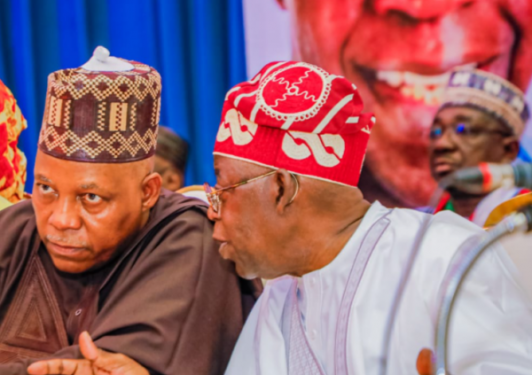Vice President Kashim Shettima has praised President Bola Ahmed Tinubu for his boldness in terminating Nigeria’s longstanding fuel subsidy regime, describing it as a courageous decision that faced fierce opposition from powerful vested interests.
Speaking during a courtesy visit by members of the Nigerian Association of Chambers of Commerce, Industry, Mines, and Agriculture at the Presidential Villa in Abuja, Shettima emphasized how previous administrations had struggled with the subsidy issue but lacked the political will to act decisively.
The Vice President highlighted the resistance Tinubu encountered from what he termed the “oil cabal” while implementing the policy change, but commended the President for maintaining his position in the national interest.
“While the fuel subsidy had been an albatross around the neck of successive administrations, he had the courage and conviction to remove it. The oil cabal fought back, but he refused to budge. He stood his ground because he acted in the best interest of Nigerians,” Shettima declared.
The Vice President acknowledged that the administration’s policy reforms, though causing temporary hardship, represent necessary measures designed to benefit Nigerian citizens in the long term.
Shettima assured the NACCIMA delegation, led by new National President Jani Ibrahim, that the current government is committed to creating a more conducive environment for serious investments and business growth.
“I can assure you that Nigeria is ready for business, and you are the drivers of change,” he told the business leaders, emphasizing the administration’s focus on private sector development.
The Vice President revealed his personal commitment to engaging with the business community, stating, “I plead guilty to romancing with the business community, the manufacturing and productive sectors. This is how great nations are built; this is how Korea became what it is.”
Shettima outlined key economic decisions implemented by President Tinubu, including fuel subsidy removal, exchange rate system realignment, and comprehensive tax reforms, all aimed at stabilizing Nigeria’s economy.
He attributed the President’s understanding of private sector needs to his business background, noting, “The current administration is your own because the President speaks your language, the language of commerce. He grew up in that ecosystem, understands how businesses are run, and was the financial controller at Mobil.”
NACCIMA President Ibrahim expressed gratitude for Shettima’s leadership in his various capacities, including chairman of the National Economic Council, National Council on Privatisation, and Presidential Enabling Business Environment Council.
“National prosperity is anchored on strong collaboration between the government and the private sector. We recognise the private sector as the engine of growth while the government sets the enabling framework,” Ibrahim stated.
The NACCIMA leader proposed more structured engagement between the private sector and the Vice President’s office, suggesting bi-annual consultative sessions to ensure policies align with business requirements.
Ibrahim also requested private sector representation on key national councils and technical bodies dealing with trade, industrial development, privatisation, and micro, small, and medium enterprises.
The newly elected NACCIMA President, who assumed leadership during the organization’s 65th Annual General Meeting in Ilorin last month, also serves as Chairman of the Organised Private Sector.



















